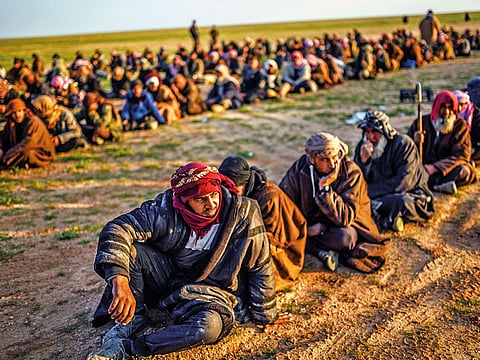Turkey captures 'senior' Daesh leader: report
Bashar Khattab Ghazal Al-Sumaidai was a commander known as Abu Zeyd

Istanbul: President Recep Tayyip Erdogan said Thursday that Turkish security forces had arrested a "senior executive" of the Daesh (ISIS) group.
Erdogan said the commander was known as Abu Zeyd. His real name was Bashar Khattab Ghazal al-Sumaidai, Erdogan told reporters on board his flight home from a three-nation tour of the Balkans.
Erdogan said a UN Security Council report published in July identified Sumaidai as "one of the senior executives of the (IS) terrorist organisation".
Turkish media said there were some indications Sumaidai may in fact be the man known as Abu Hasan al-Hashimi Al-Qurashi - an Iraqi who is the new self-proclaimed caliph, or leader, of the entire Daesh group.
Erdogan only referred to Sumaidai as a top Daesh official in Syria.
"In his interrogation, he also stated that he was a so-called 'qadi' of the so-called ministry of education and ministry of justice," Turkish media quoted Erdogan as saying. A qadi is a judge.
Erdogan did not say when the Daesh commander was captured.
"This terrorist's connections in Syria and Istanbul had been followed for a long time, and intelligence information was obtained that he would enter Turkey illegally," Erdogan said.
"This terrorist was caught in a successful operation of the MIT security service and the Istanbul police."
After a meteoric rise in 2014 in Iraq and Syria that saw it conquer vast swathes of territory, Daesh saw its self-proclaimed "caliphate" collapse under a wave of offensives.
It was defeated in Iraq in 2017 and in Syria two years later, but sleeper cells of the extremist group still carry out attacks in both countries.
Syria's war began in 2011 and has killed nearly half a million people and forced around half of the country's pre-war population from their homes.
Clearing operation
The Washington Post quoted US Central Command on Wednesday that, over the last two weeks alone, Syrian Defense Forces (SDF) had apprehended “dozens” of suspects at the Al Hol camp in northeast Syria and dissolved a “major ISIS [Daesh] facilitation network.”
The operation is ongoing, according to a US defence official, who spoke on the condition of anonymity to detail an unfolding situation.
The raid, characterised as a “full clearing operation,” is the largest carried out at the Al Hol camp since May 2021, the official said. It marked the seventh time this year that SDF units, enabled by their American allies, have raided the sprawling desert complex that houses about 55,000 people - many of them deemed Daesh sympathisers who traveled to Syria and Iraq at the height of the group’s power.
Each raid has resulted in the detention of between 40 and 120 suspected Daesh operatives.
Col. Joe Buccino, a spokesman for US Central Command, said in a statement that, as part of the ongoing operation, Syrian forces on Monday rescued four women located in tunnels where they had been chained and tortured.
Contrary to smaller-scale military raids designed to capture or kill targets in the span of a few hours, full clearing operations typically comprise multiple targets and involve lengthy searches of structures, pat-downs, biometric collection and intense questioning. As in this case, they can take weeks.
For this and other efforts undertaken at Al Hol, the US military personnel identified the targets based on intelligence gathered from tipsters, the defence official said. US forces spearheaded much of the planning, coordinating the Syrian Defence Forces with the police and security guard units stationed inside the camp.
It’s unclear how many of the detainees rounded up in recent weeks are children, who account for more than half of the camp’s population. The vast majority of residents at Al Hol - Syria’s largest refugee camp - are women and children considered to be members of Daesh or their relatives.
Residents come from 50 countries
“This operation will make the camp safer for those residents who remain or wish to return to their countries of origin but are unable to do so,” said Buccino, stressing that officials’ goal is for those at Al Hol to be rehabilitated and repatriated to their home countries.
The process of moving individuals out of Al Hol has lagged. Its residents come from more than 50 countries, not all of which have been eager to bring back identified Daesh operatives and sympathisers, or even their children.
Most Western nations have only recently begun to bring back refugees by the dozens, while Iraq has repatriated nearly 2,500, according to a recent US State Department count.
Almost half of the camp’s residents hail from Iraq, and more than a third come from within Syria - both of which still struggle with challenges stemming from terrorism and instability. As such, there are limitations to how swiftly relocations can occur.
“The SDF will continue its efforts to eliminate the Daesh threat,” Buccino said, “but it remains critical that the international community support this effort through repatriation.”



